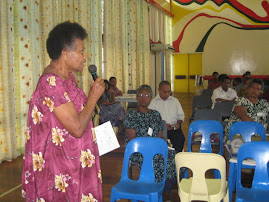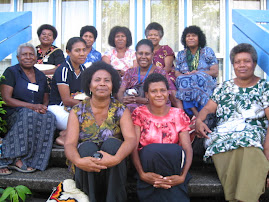
The term 'gender responsive budgeting' (GRB) generally refers to initiatives that monitor and asssess the impact of government revenue and expenditure between men and women, boys and girls. It is commonly known by various terms like, gender friendly budgets, women's budgets, gender budgeting, gender sensitive budgets to name a few. However, in this forum, gender responsive budgeting (GRB) would be used.
The benefits of achieving gender responsive budgeting are many which include:
- providing information that allows for better policy decision making on how policy priorities can be altered and how resources could be redistributed towards achieving gender equality (for advocacy).
- improvement of economic governance and financial administration. That is, can inform government constantly of whether it is meeting its citizens' needs particularly among men and women, boys and girls. From those outside of government, GRB can be used to promote transparency, accountability and participation.
However, it is important to understand that GRB initiatives do not seek to create separate budgets for women.
GRB is about ensuring that public money is allocated in an equitable manner so that those with pressing needs benefit fairly. In other words, it is about limited resources being redistributed so that marginalised groups could benefit equally.
Bangladesh has initiated activities surrounding this concept which provides a good background of what GRB is. UNIFEM, one of the arms of the United Nations that promotes gender equality also has been working on this agenda for quite awhile.
The 'International Open Budget Initiative' also promotes the agenda internationally in partnership with non government organisations (NGOs) around the world, esp. in third world countries under the 'Open Budgeting' Concept. It encourages these NGOs to monitor and evaluate the budget performances of their governments.
.....................................................
2 May 2010
Hello again friends!!
As I had mentioned in my brief Project Proposal and Plan, I have been consulting with organisations in Brisbane in order to obtain information on how the initiative is developed and implemented. Australia, being the first country to introduce the concept in its federal budgetary and policy processes in 1984, it is widely institutionalised at all levels and sectors - that is, mainly government and civil society levels and sectors. The response from the organisations is highly commendable as they were very helpful with the information I sought.
However, the response from the PNG community has been very limited due to many reasons, of which some are identified and mentioned in the Project Proposal and Plan. On the whole, it was a good exercise. A detailed information on how and what information was obtained, their usefulness, and the experiences of undertaking such an initiative will be posted later in a couple of days time. Thanks for spending time reading this and also appreciate your contributions.
Thanks
Wallis
..............................................
25 May 2010
Success stories of community action to promote GRB
Hi again,
You maybe wondering why there are so many pictures and video bars in this page. Well, let me take you through each one of them. Work on the Gender Responsive Budgeting(GRB) has expanded all over the world tremendously as more and more people realise the immense benefits it brings into the lives of so many ordinary folks, especially those that are marginalised, like women, children or even rural people in third world countries. For instance,video bar 1 brings you all the successful stories of women who have never given up hope in advocating for local government budgets to recognise the needs of women in India, similar stories are also told in Bolivia, Morocco and elsewhere.
These testimonies reflect that community action based on the needs of the locality is the foundation for effectively achieving community development and to promote improved livelihood for people. But the other side of the coin is that decision makers have to also be responsive to the calls from their local citizens. Some initiatives can be realised by mobilising local social capital such as environment sustainability initiatives.
However, the goals and objectives of GRB can to a larger extent be achieved through making decision makers take ownership of the initiative and a constant push from a civil society sector that is vibrant for this to be recognised. It needs to be an equal effort on both sides. I would therefore encourage you to watch the individual success stories of the video clips if this is an area of interest for those of you who are reading this.
The Video Bar 2 takes you through another life experience altogether where communities and a number of international partners (donors + churches) through mobilising, encouraging community participation and innovation address local needs like accessing clean water and adult literacy. As is reflected, the absence of government support is quite obvious.
Hence, the success stories of others overcoming barriers to achieve equal redistribution of resources based on citizens' needs is a significant motivational factor for others like those in PNG to undertake similar steps. GRB is seen to be addressing existing inequities in the allocation of public resources at different levels of government.
Thank you for joinging me in sharing ideas on this initiative.
........................................................
Monday, 31 May 2010
Hello friends once again
I wish to share briefly my personal experience of applying consultation and participation methods in promoting collective action to foster community development from the perspective of the implementation of my project.
Project
My project "Gender Responsive Budgeting" according to the project plan was divided into two parts. First was to be implemented as part of the assessment of the Course SWS7123. Second was to be implemented back in PNG after the completion of my studies.
Process
The first component was to seek information by consulting organisations that are undertaking similar initiatives around Brisbane area and at the same time provide a forum to encourage ongoing participation by interested persons. The most targetted to participate in this forum was the PNG student community in Brisbane and few others from back in PNG. In doing so, the consultation and participation methods were applied.
Response/results
Most of the organisations consulted around Brisbane were terrifically responsive and provided information or they were a point of referral for me to engage with other most relevant agencies.
However, on the part of PNG groups, response from back home was good but recieved zero response from the student community here in Brisbane.
Reasons
The reasons for the above are many but the most obvious ones are:
(1)that the timing for the invitation to participate and provide comments was not suitable as the students were busy catching up with their own assessments.
(2) The blog site proved to be too technical for these people to input comments. As one of the individual consulted from PNG mentioned...he could not be able to even locate the comment section, let alone be able to enter anything without knowing the technicalities of it.
Hence, based on these I would say that in order to hammer in on what is needed to be achieved, the timing must be right, messages and the medium to deliver these messages must be simple and understandable and must be accessible by majority of the people or target audiences.
From a personal point view of the whole exercise, I am happy that I took the course because by now at least I know how to operate a blogsite and can be able to develop plans and implement community development initiatives. However, it was generally very challenging.
My future plans of the project
Whilst, specifically GRB is a new area of interest for me, I have worked on related at a broader level - participating in the International Open Budget Initiative for the last two years. Hence, it is an area where I have developed interest, and I hope that when I go back to PNG, I get a job that would let me continue this initiative.
It has been an exciting journey for me and I hope it was for you all too.
Good luck in your future endeavours!!
Wallis





